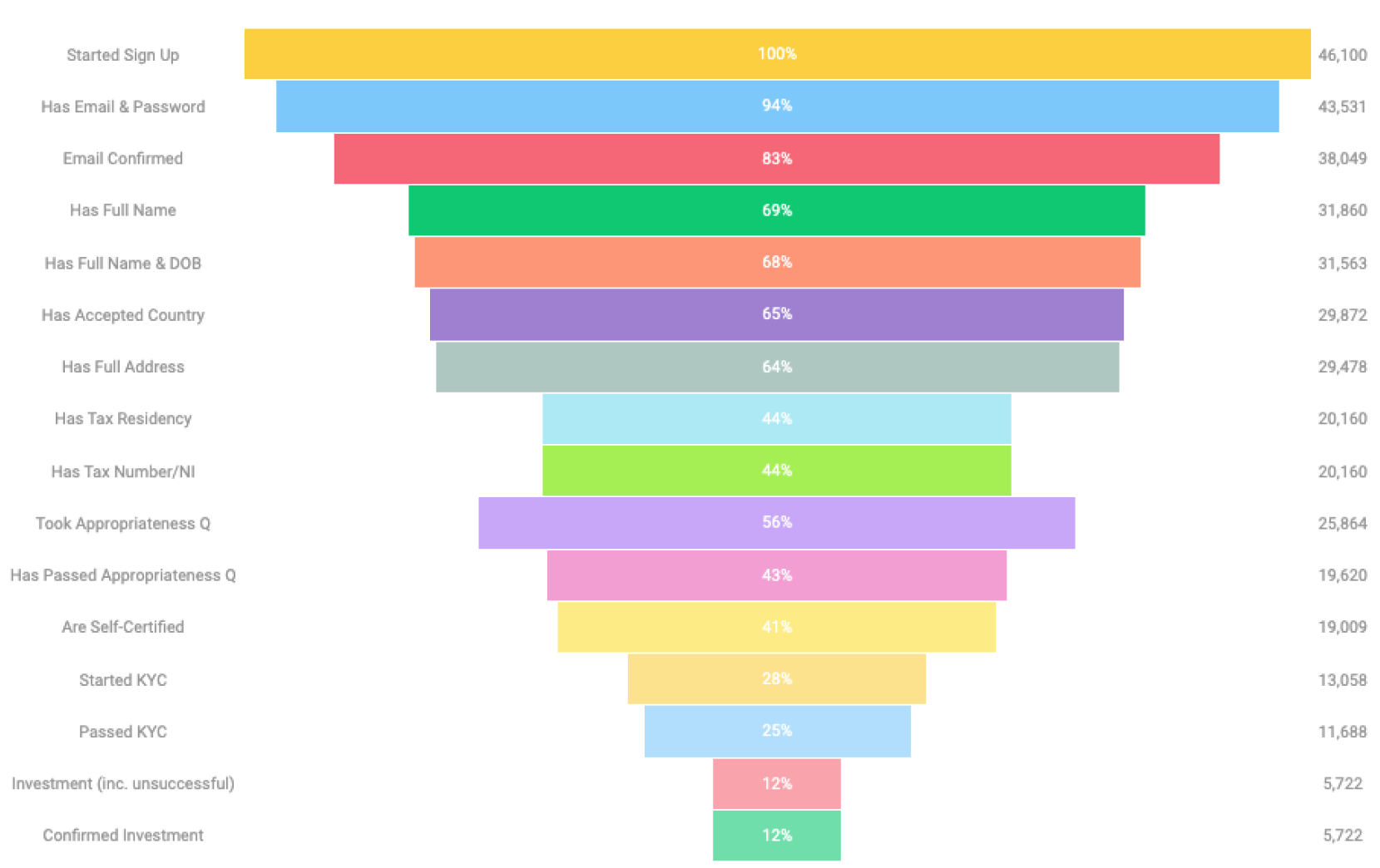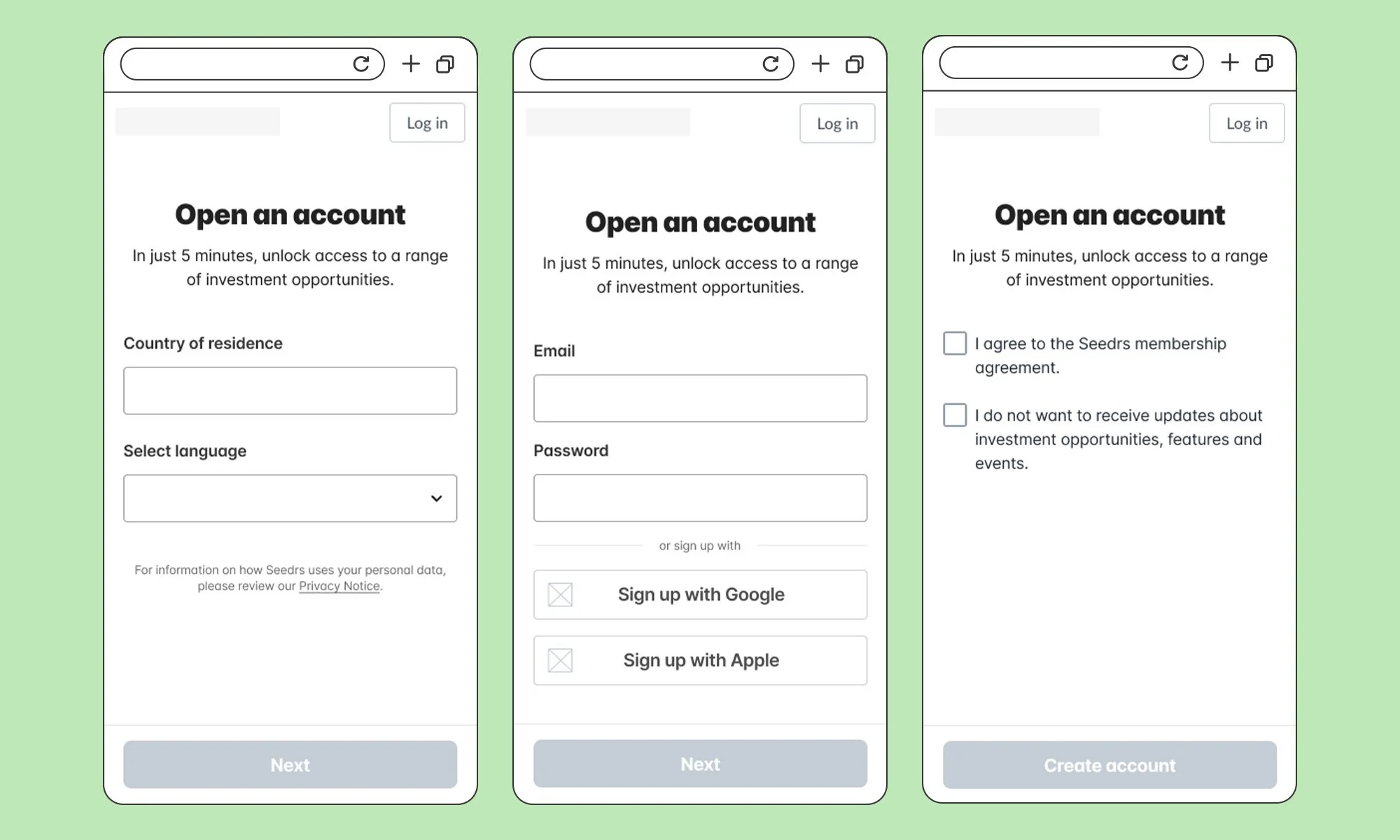/Seedrs
onboarding
About
For users to be able to invest on the Seedrs platform they must first create an account and complete several steps to ensure that they are eligible and then pass a few anti money laundering (AML) safe checks.
The problem
The Existing onboarding journey had an immense drop-off rate and once the user had onboarded they would then need to pass through an additional identity verification process which led to further drop-off.
That coupled with restrictions brought in by the FCA in 2023 and the necessity to support further additional regions (Seedrs having just been approved to operate throughout the EU, which would come with their own regulations and restrictions) meant that the existing onboarding journey was no longer suitable.
The goal
Design a new onboarding journey that would:
Support onboarding users from all supported regions
Support both investors and institutions
Reduce drop-off rate
The process
Testing and identifying pain points
The first step before putting pencil to paper was to assess the health of the current onboarding journey to identify and understand what was causing user drop-off. In order to accomplish this and give internal stakeholders more clarity on progression I created a UX research plan and documented it in Notion.
In doing so I was able to lay out the steps ahead and add a somewhat accurate timeline for the project and an indication of where we were in the journey. The documentation would also provide a home for all the collected research as well as a place to showcase the different design versions alongside results from testing to provide context for key decisions and to aid in communicating design rationale to key stakeholders.
Research methods included:
User testing sessions and interviews
Reviewing existing performance analytics
User surveys
User interviews and in-depth research to understand:
What pain points exist on the onboarding journey
Why our users are dropping off
How we can reduce friction
Extract ideas around how we can increase conversion in the onboarding journey
Through testing several pain points were highlighted with the existing journey:
Users were unsure of the duration of the onboarding journey as it just seemed to “go on and on” and were unsure of where they were “Is this going to take 2 more minutes or 2 more hours? I don’t know”
Users were unaware of some of the documentation that they would need to progress (one user stated that when they attempted to sign up they were on a bus and didn't have their NI number to hand so gave up)
Users felt confused by the layout in some areas stating that they didn’t know which buttons to press in order to continue.
Once we had an idea of what was causing drop-off we were able to take this feedback turn them into user stories and then work them into a series of hypotheses. The main hypothesis were as follows:
Providing users with a clear understanding of what they need before they start their onboarding journey can make them feel better equipped and more confident in completing the process. Here are a few ways you can help users prepare for onboarding:
Pre-Onboarding Information: Before users begin the onboarding process, offer them an overview or introduction that explains what to expect. Provide a high-level outline of the steps involved, any necessary prerequisites, and the estimated time required. This information can help users mentally prepare and feel more confident about starting.
Required Documents or Information: If there are specific documents or information that users need to have ready during onboarding, communicate those requirements clearly. Provide a checklist or a list of items they should gather in advance, ensuring they have everything necessary to complete the process smoothly.
wires demonstrating welcome page
By changing the prominence and order of the CTAs on the signup screen it will be clearer to the user what they need to do to start an account and onboarding via the use of socials will Reduce the amount of drop-off from verifying email addresses
wires for first page
Design and test
Armed with the information we needed it was time to map out all of the various use cases. These would include:
UK investors
UK institutions
EU Investors
EU Institutions
Accredited Investors from approved countries list
We then wired out these flows so that we could begin discussions with the development team, Compliance, and any internal stakeholders. Once we had High fidelity designs in place it was time to test design solutions, Testing methods included:
User testing sessions and interviews with both new and established users
Variation testing on Lyssna
Outcome
Once everything came together we were able to create an onboarding journey that could cater to various regions, had a better sense of progression, and a clearer indication of what to expect throughout the journey. The signup journey was then also used as the basis for the onboarding journey on the Seedrs mobile app.
Status
Built - Currently in testing and preparing for deployment.











